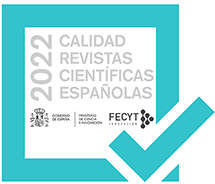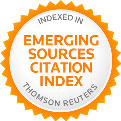La práctica federada como elemento de desarrollo del conocimiento: aplicación al voleibol de formación. (The federated practice as element of development of the knowledge: application to the formation volleyball).
Resumen
El propósito del estudio fue analizar la influencia de la experiencia en práctica federada sobre el desarrollo del conocimiento declarativo y procedimental en jugadores de voleibol en categorías de formación. Se ha planteado un estudio descriptivo correlacional en el que han participado un total de 450 jugadores de voleibol. La variable independiente fue la experiencia en práctica federada, y las variables dependientes fueron el conocimiento declarativo y el conocimiento procedimental que fueron medidas mediante la cumplimentación de dos cuestionarios. De los resultados del estudio podemos destacar que se encontraron diferencias significativas en función de la experiencia en práctica federada, tanto en el conocimiento declarativo como en el conocimiento procedimental, produciéndose un salto en el conocimiento a partir del cuarto año de experiencia. Estos resultados son similares a los obtenidos en diversos estudios basados en la pericia deportiva en voleibol, confirmándose la importancia de la experiencia vivida por el deportista para el desarrollo del conocimiento y con ello de la pericia deportiva.
palabras claves: conocimiento declarativo; conocimiento procedimental; experiencia y voleibol.
Abstract
The intention of the study was to analyze the influence of the experience in practice federated on the development of the declarative and procedural knowledge in players of volleyball in categories of formation. It has presented a descriptive correlational study that enrolled a total of 450 volleyball players. The independent variable was the experience in federated practice, and the dependent variables were the declarative knowledge and procedural knowledge that were measured by completing two questionnaires. From the results of the study we can distinguish that they found significant differences depending on the experience in federated practice, both in the declarative knowledge and in the procedural knowledge, producing a in the knowledge from the fourth year of experience. These results are similar to the obtained in diverse studies based on the expertise in volleyball, being confirmed the importance of the experience lived by the player for the development of the knowledge.
key words: Declarative knowledge; procedural knowledge; experience and volleyball.
doi:10.5232/ricyde2011.02406
---------------------------------------------------------------------
Referencias/references
Abernethy, B.; Neal, R. J., y Koning, P. (1994). Visual-Perceptual and congnitive differences between expert, intermediate, and novice snookers players. Applied cognitive psychology, 8, 185-211.
doi:10.1002/acp.2350080302
Anderson, J. R. (1982). Acquisition of cognitive skill. Psychological Review, 89, 369-406.
doi:10.1037/0033-295X.89.4.369
Anderson, J. R. (1987). Skill acquisition: Compilation of weak-method problem solutions. Psychological Review, 94, 192-210.
doi:10.1037/0033-295X.94.2.192
Baker, J., y Horton, S. (2004). A review of primary and secondary influences on sport expertise. High Ability Studies, 15(2), 211-228.
doi:10.1080/1359813042000314781
Baker, J.; Côté, J., y Deakin, J. (2005). Expertise in ultra-endurance triathletes: Early involvement, training structure and the theory of deliberate practice. Journal of Applied Sport Psychology, 17, 64-78.
doi:10.1080/10413200590907577
Berry, J.; Abernethy, B., y Côté, J. (2008). The contribution of structured activity and deliberate play to the development of expert perceptual and decision-making skill. Journal of Sport & Exercise Psychology, 30, 685-708.
PMid:19164836
Bläsing, B.; Tenenbaum, G., y Schack, T. (2009). The cognitive structure of movements in classical dance. Psychology of Sport and Exercise, 10(3), 350–360.
doi:10.1016/j.psychsport.2008.10.001
Catteuw, P.; Helsen, W.; Gilis, B., y Wagemans, J. (2009). Decision-making skills, role specificity, and deliberate practice in association football refereeing. Journal of Sport Science, 27(11), 1125-1136.
doi:10.1080/02640410903079179
PMid:19714544
Del Villar, F.; García-González, L.; Iglesias, D.; Moreno, M. P., y Cervelló, E. M. (2007). Expert-novice differences in cognitive and execution skills during tennis competition. Perceptual and Motor Skills, 104, 355-365.
doi:10.2466/pms.104.2.355-365
PMid:17566424
Ericsson, K. A.; Krampe, R. T., y Tesch-Römer, C. (1993). The role of deliberate practice in the acquisition of expert performance. Psychological Review, 100, 363-406.
doi:10.1037/0033-295X.100.3.363
Ericsson, K. A. (2008). Deliberate practice and acquisition of expert perfomance: a general overview. Academic Emergency Medicine, 15, 988-994.
doi:10.1111/j.1553-2712.2008.00227.x
PMid:18778378
Garland, D. J., y Barry, J. R. (1990). Sport expertise: the cognitive advantage. Perceptual and Motor Skills. 70, 1299-1314.
PMid:2204879
Kline, R. B. (2004). Beyond significance testing: Reforming data analysis methods in behavioral research. Washington, DC: American Psychological Association.
doi:10.1037/10693-000
Macquet, A. C. (2009). Recognition Within the Decision-Making Process: A Case Study of Expert Volleyball Players. Journal of Applied Sport Psychology, 21, 64-79.
doi:10.1080/10413200802575759
Mann, D. T. Y.; Williams, A. M.; Ward, P., y Janelle, C. M. (2007). Perceptual-Cognitive Expertise in Sport: A Meta-Analysis. Journal of Sport & Exercise Psychology, 29, 457-478.
PMid:17968048
McPherson, S. L., y Thomas, J. R. (1989). Relation of knowledge and performance in boys´ tennis: age and expertise. Journal of Experimental Child Psychology, 48, 190-211.
doi:10.1016/0022-0965(89)90002-7
McPherson, S. L. (1999a). Expert-novice differences in performance skills and problem representations of youth and adults during tennis competition. Research Quarterly for Exercise and Sport, 70, 233-251.
PMid:10522282
McPherson, S. L. (1999b). Tactical differences in problem representations and solutions in collegiate varsity and beginner female tennis players. Research Quarterly for Exercise and Sport, 70, 369-384.
PMid:10797895
McPherson, S. L., y Kernodle, M. W. (2007). Mapping two new points on the tennis expertise continuum: Tactical skills of adult advanced beginners and entry-level professionals during competition. Journal of Sports Sciences, 25(8), 945-959.
doi:10.1080/02640410600908035
PMid:17474048
Moran, A. (2009). Cognitive psychology in sport: Progress and prospects. Psychology of Sport and Exercise, 10, 420-426.
doi:10.1016/j.psychsport.2009.02.010
Nielsen, T. M., y McPherson, S. L. (2001). Response selection and execution skills of professionals and novices during singles tennis competition. Perceptual and Motor Skills, 93, 541-555.
PMid:11769911
Tenembaum, G.; Yuval, R.; Elbaz, G.; Bar-Eli, M., y Weinberg, R. (1993). The relationship between cognitive characteristics and decision making. Cannadian Journal of Applied Physiology, 18(1), 48-62.
doi:10.1139/h93-006
PMid:8471994
Ward, P.; Hodges, N. J.; Starkes, J. L., y Williams, M. (2007). The road to excellence: Deliberate practice and the development of expertise. High Ability Studies, 18, 119-153.
doi:10.1080/13598130701709715
---------------------------------------------------------------------
Palabras clave/key words
Texto completo/Full Text:
PDF------------------------ 0 -------------------------
RICYDE. Revista Internacional de Ciencias del Deporte
![]()

Publisher: Ramón Cantó Alcaraz
ISSN:1885-3137 - Periodicidad Trimestral / Quarterly

